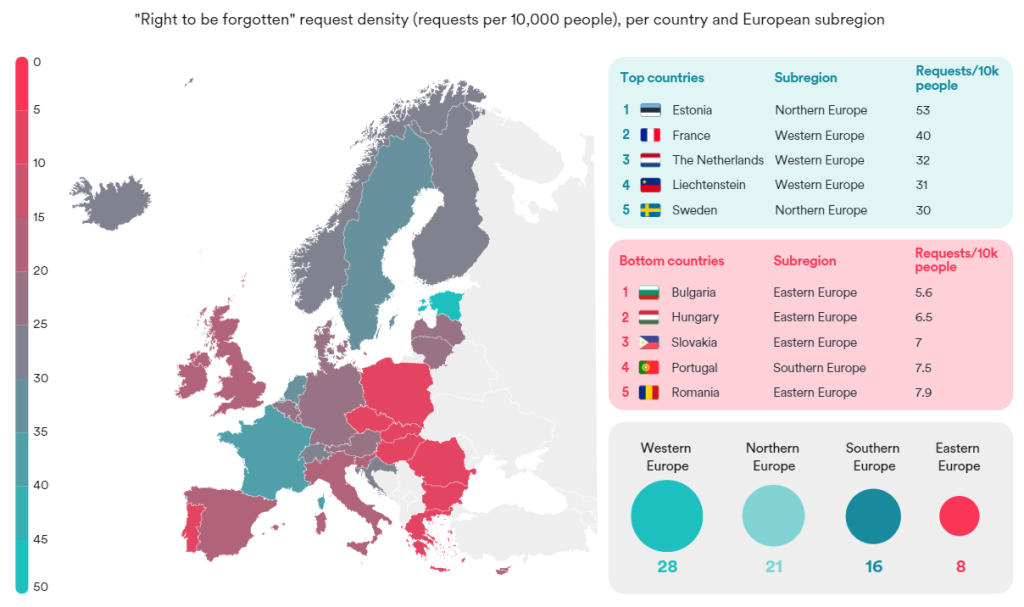:quality(80)/business-review.eu/wp-content/uploads/2023/03/dreamstime_s_163649986.jpg)
Romanians are among the lowest requesters for their data to be removed from search engines’ results, shows Surfshark’s study on the “right to be forgotten” which found that Romania is in 13th place with 15.2k requests to delist web pages from search engines such as Google and Microsoft Bing.
In total, Europeans submitted over 1 million “right to be forgotten” requests to Google and Microsoft Bing, according to Surfshark recently released study, which analysed the “right to be forgotten” requests. From 2015 to 2021, over 1 million requests were submitted to Google and Microsoft Bing, with half of the requests being from Western European countries. Romania is in 13th place (out of 32) with around 15.2 thousand total requests. When the Covid-19 pandemic started, “right to be forgotten” cases rose by nearly 30% in 2020. Overall, French requests accounted for nearly a fourth of all submitted requests, while Estonia had the most requests per 10,000 people. Eastern European countries exercised their “right to erasure” the least.
The “right to be forgotten” allows individuals to ask web pages to delist queries related to their name from European search engine result pages. It applies to countries covered by GDPR (the EU and the EEA) and other European countries that have adopted similar laws, like the UK and Switzerland. Information about requesters within these web pages widely varies, from personal and professional information to connections with criminal activity.
From 2015 to 2021, 1,066,274 “right to be forgotten” or “right to erasure” requests were submitted to Google and Bing. Of the two search engines, the vast majority (95.8%) of requests were delivered to Google. 2015 marked the first full year the policy had been in place, where 169.2k requests were submitted throughout the year.
After 2015, “right to be forgotten” requests gradually decreased until 2020. Cases rose nearly 30% in 2020, totaling 161.3k. For example, Cyprus and Portugal submitted almost three times more requests in 2020 than the previous year. Romania also had an increase of 36% in 2020. 2021 saw an additional 15% increase across the board, with an all-time high of 185.7k requests across the analyzed countries.
“One of the reasons for the rise in the “right to be forgotten” requests in 2020 could be attributed to the COVID-19 pandemic. As many daily activities became virtual, it encouraged people to be more conscious of their digital hygiene and review their privacy online,” says Gabriele Kaveckyte, Privacy Counsel at Surfshark. “At the same time, GDPR enforcement accelerated and continues to enforce online privacy as a fundamental human right to this day.”
France submitted the most “right to be forgotten” requests between 2015 and 2021, with 255.6k requests accounting for nearly a fourth of all requests submitted over this period. 176.1k requests came from Germany, and 125.3k from the UK, with each country accounting for around 17% and 12% of the total, respectively. Requests submitted by these three countries comprise around half of all “right to be forgotten” requests submitted between 2015 and 2020. Romania is in the 13th (out of 32) place with around 15.2K total requests.

Estonia leads in the “right to be forgotten” request density
Regarding request density (i.e., requests per 10k people), Estonia comes first with 53 requests per 10k people (more than 2.5 times higher than average). France takes the 2nd position with 40, and the Netherlands takes 3rd with 32 requests per 10k people. Romania comes 28th (out of 32) with 8 requests per 10 thousand individuals. Bulgaria submitted the least requests per 10k people over the years, with around 6, over three times lower than the average of all the examined countries.
Western and Northern Europe have the highest request density, with 28 and 21 requests per 10k people, respectively. Southern Europe issued 16 requests, and Eastern Europe issued eight requests per 10k people.
1 in 10 “right to be forgotten” web page delisting requests are crime-related
4,009,729 web pages were included in the requests submitted to Google over 2015-2021. For Google, European requesters asked to remove four web pages per request from its search results on average, while Romanians requested 5. In general, around half of the pages asked to be delisted from Google couldn’t be classed into a specific category, and nearly 17% fell under professional information (contained a requester’s work address, contact information, or general information about their business activities).
Around 1 in 10 web pages referenced the requester concerning crimes, including those within their professional field. Around 6% contained the requester’s personal information, such as their home address, residence, or other contact information, and images and videos of the individual.
As with other search engines and following the GDPR “right to erasure” policy, you can issue a “right to be forgotten” request to Google by completing a Personal Information Removal Request Form or Microsoft Bing Request to Block Bing Search Results In Europe.
Photo: Dreamstime.com




:quality(80)/business-review.eu/wp-content/uploads/2024/06/Digital-Nation.png)



:quality(80)/business-review.eu/wp-content/uploads/2024/06/22C0420_006.jpg)

:quality(80)/business-review.eu/wp-content/uploads/2024/06/COVER-1-4.jpg)



:quality(80)/business-review.eu/wp-content/uploads/2024/06/br-june-2.jpg)
:quality(50)/business-review.eu/wp-content/uploads/2024/07/vodafone-RO.jpg)
:quality(50)/business-review.eu/wp-content/uploads/2024/07/BeFunky-collage-37-scaled.jpg)
:quality(50)/business-review.eu/wp-content/uploads/2024/07/04_ThinkPad_T14s_6_Business_Coworking.jpg)